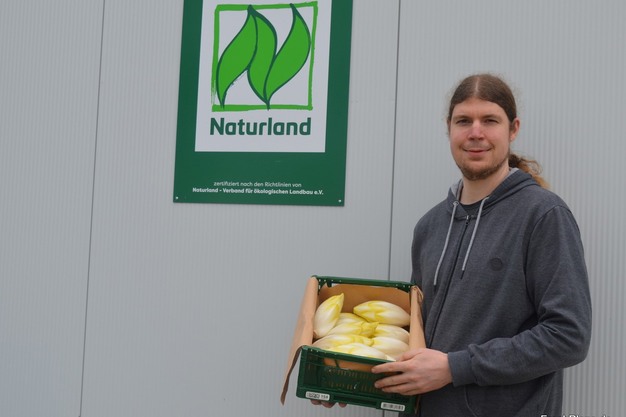Post-Easter, the demand for chicory typically experiences a noticeable decline. "However, the current cold, wet weather is actually playing into our hands for the marketing of chicory," shares Stephan Klünemann, a Naturland producer and owner of Goldköpfe Ltd. "Easter is usually still prime time for chicory, but afterwards, other types of lettuce take center stage. This is also due to the fact that in Germany, chicory is primarily consumed as a salad. This year, however, the demand for chicory has remained high even after Easter."

Owner and CEO Stephan Klünemann of Goldköpfe. The chicory produced by him is marketed through Gartenbauzentrale Papenburg.
Contrary to the pleasing marketing situation, this year's root yields have been rather weak due to waterlogging in the fields. Klünemann: "We have responded accordingly and pre-ordered roots early from our two main suppliers. Furthermore, in organic production, we use additional substrate, which means the chicory does not stand directly in water as is often the case in conventional cultivation. This reduces the risk of fungal infections and at the same time ensures a certain level of production security. In practice, this allows us to also produce healthy, marketable chicory sprouts from weaker roots or problematic batches. I have already been contacted by industry colleagues looking for additional quantities. A sign that the market for organic chicory is quite empty at the moment." Nevertheless, Klünemann also has to accept relatively higher losses per growing box this year due to fungal diseases like Phytophthora.

In the forcing house, both white and red chicory sprouts can be found. Despite the still low market share, Klünemann observes a slightly increasing demand for red chicory. The Naturland chicory grows on special substrate, consisting of organic compost and wood fiber. Due to the relatively thicker roots, mainly two instead of three or four sprouts per 300g flow pack are currently found.
Phased production expansion
In 2018, Klünemann decided to convert the family's pig farm in Geeste-Groß Hesepe into a chicory forcing house. The new site in Niederlangen was then put into operation in 2022. "Currently, we are producing about 10 tons a week, theoretically, the capacities are available to produce 20 tons a week in the future," says the Naturland producer, who has so far mainly served the health food retail market and, additionally, the regular retail grocery trade. Particularly in the latter sales channel, the inflation-related purchasing restraint has been noticeable, Klünemann confirms. "However, this has normalized somewhat this year, so we can now slowly turn our attention to customer acquisition. Especially in the regular retail grocery trade, I see interesting growth potential in the coming years, especially since organic and regional go hand in hand and are increasingly valued by consumers."
For more information:
Stephan Klünemann
Goldköpfe GmbH
Luddenfehn 29
49779 Niederlangen
Tel: +49 176 63324383
[email protected]










